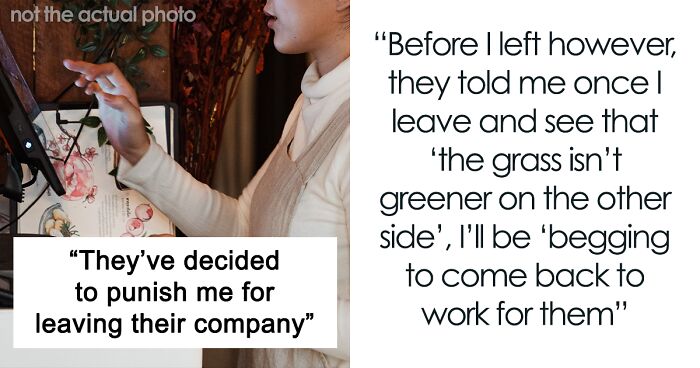
Company “Punishes” Employee For Leaving By Giving Them Work Every Day For Two Weeks
InterviewIt seems that nightmarish post-two weeks’ notice scenarios have become a running trend. A week ago, it was a boss who fired the guy on the spot simply for handing in his resignation letter. This time, it’s a supervisor who made a worker’s next two weeks a living hell.
As the user by the name of ‘TheKittensAreMelting‘ shared in his infuriating r/antiwork story, the reaction to his departure from work wasn’t what you’d call appropriate. Not only did his superior switch up the schedule so that he would be forced to work from sun up to sun down, but he’d also held the poor guy’s days off hostage, demanding only one thing in return — that he would stay.
Making changes in your career can be scary
Image credits: Ketut Subiyanto (not the actual photo)
While it may seem surprising that anyone could do that to their employees, especially the hard-working ones, the recent data might have an answer: in April, May, and June 2021 alone, a total of 11.5 million workers in the US quit their jobs, with 48% of the total surveyed participants actively planning to change jobs. Sounds like the global pandemic was the iceberg and the broken job industry its Titanic.
Still, nothing gives you a right to treat your tireless workers like a piece of machinery — be it the “Great Recession” or the “Great Resignation”, a term that was coined by Dr. Anthony Klotz to describe the mass exodus of workers leaving their jobs after Covid shook up the world.
“There are pent-up resignations that didn’t happen over the past year,” Klotz, an associate professor of management at May Business School at Texas A&M University and organizational psychologist, told Bored Panda. He believes there are a lot of power dynamics at play when someone is resigning and that can make some managers react poorly. “Most of the time, when you’re an employee and you work for a company — the company has all the power. As soon as you decide to quit, the power balance shifts.”
Especially when there are managers who will sabotage the remainder of your work just to make your life a living hell
According to Klotz’ research, there are two biggest factors that determine how two weeks’ notice will be taken by the superior — one of them is fair treatment. “The resignation period is the last chance to get even with your company. If your company’s treated you well, that’s your last chance to pay them back,” he told, adding that the same principle applies if things went the other way around.
What if both you and your manager were satisfied with each other — you know, no hard feelings — but somehow your resignation letter showed their true colors? Klotz likens it to being dumped by your high-school sweetheart. “How do people usually respond when somebody breaks up with them? We get upset and say, ‘Fine, get lost.’ In the same way, emotions can get the best of supervisors as well,” he told.
On the bright side, he believes that the last few decades have showed a positive change. “It used to be that it was always a betrayal. Now, if an employee is resigning, more and more organizations say, ‘Let’s send them on their way, wish them good luck and continue to keep in touch with them so that we can bring them back as a ‘boomerang employee’ at some point in the future.'”
We have a feeling u/TheKittensAreMelting won’t be finding his way back to the same company after how awfully he was treated on his way out. However, Klotz thinks that “the rise of boomerang employees could last for the next five years.” And studies conducted by Research Now in 2016 support this notion: nearly one-third (29%) of all participants have returned to a previous employer, while 41% didn’t shy away from the idea that one day they could boomerang back.
Supportive responses inspired the author to take some action
As in most cases, when you sense that you’re being treated unfairly, especially after all you’ve done for the company — it’s only natural that you want to fight back. But Philip Landau, an employment lawyer at Landau Law firm based in the UK, suggests not rushing into it because the legal definition of what amounts to workplace bullying or harassment often lies in a grey area.
“You need to make sure that you are receiving unfair treatment by your line manager, as opposed to being on the receiving end of robust but reasonable instructions,” Landau told Bored Panda. “Some managers have a rather stern approach which can be unpleasant, but if you are not being singled out, this may not amount to unfair treatment.”
He then pointed out that it’s always for the best to record everything that happens between you and your manager in a diary, “so that you can present the facts clearly and with suitable evidence” when the right time comes.
Here are some of the reactions people had after reading the story
Finally, Klotz reminded workers that the resignation period is a stressful, turbulent two-way street for both you and your manager—although we often don’t see it that way. “When I do hear about managers handling it poorly, I understand the psychology of why it happens. Not only you’ve made the manager’s job more difficult because they have to manage the remaining employees who now have a larger workload. They also might start thinking, ‘Why did she leave? Maybe we should follow them?'”
Just like Landau, Klotz says there’s no justification for burning that bridge as soon as the resignation is handed in. But it still happens. “Many employees will decide to be signed off during their notice period for stress and anxiety so that they don’t have to go back into work once they have resigned,” Landau said, confirming that post-resignation harassment does happen quite often.
There are many reasons why someone wouldn’t choose to proceed with legal action, rather bite their tongue and suck it up. Besides spiraling anxiety, there’s also social stigma attached to it: as this 2018 study shows, HR professionals and the broader public perceived people who had quit their jobs as altogether less competent, less warm and less hireable from the moment they became unemployed. And the only way to diminish this stigma was to offer proof that you left the job due to external factors, as in unfair treatment by your monstrous boss.
But in order to do that, you have to have enough finances and backbone made out of the strongest titanium to go forward with the legal motion, right? Landau calms us down and reminds us that there are plenty of organizations that will be able to help those in need. Besides pro bono helplines offered by many universities (at least in UK), “there is the Citizens Advice Bureau, the ACAS helpline, and employment lawyers who will offer a free initial consultation.”
Hey panda, hungry for more stories like this? Here, check this and this out!
Kinda disappointed that he worked the two weeks, even with his days off. They're gonna pull this crap with every employee who quits, holding the threat of a bad reference over their heads, and it needs to be brought to someone's attention.
Exactly! I don't know what size/type of company this is, but my first thought was 'this is why exit interviews exist'. Threatening employees is not a way to retain them.
Load More Replies...What record? If you need a reference give your friends phone number tell them they were your supervisor or don't use that company as a reference at all since they threatened you. Give them a bad review put it in their record. Do it anonymously if you have to. Get your friends and family to do it too. This is ridiculous what corporations get away with.
Kinda disappointed that he worked the two weeks, even with his days off. They're gonna pull this crap with every employee who quits, holding the threat of a bad reference over their heads, and it needs to be brought to someone's attention.
Exactly! I don't know what size/type of company this is, but my first thought was 'this is why exit interviews exist'. Threatening employees is not a way to retain them.
Load More Replies...What record? If you need a reference give your friends phone number tell them they were your supervisor or don't use that company as a reference at all since they threatened you. Give them a bad review put it in their record. Do it anonymously if you have to. Get your friends and family to do it too. This is ridiculous what corporations get away with.

 Dark Mode
Dark Mode 

 No fees, cancel anytime
No fees, cancel anytime 





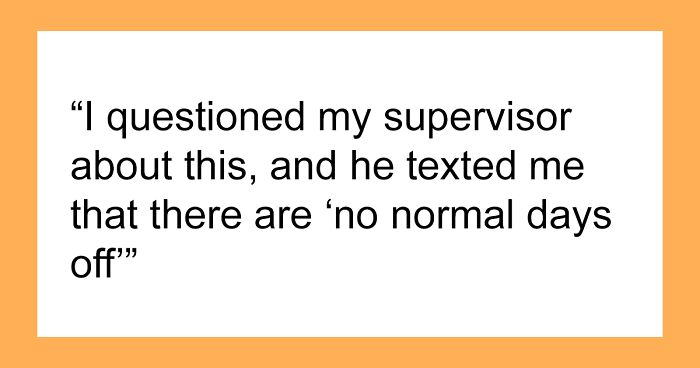


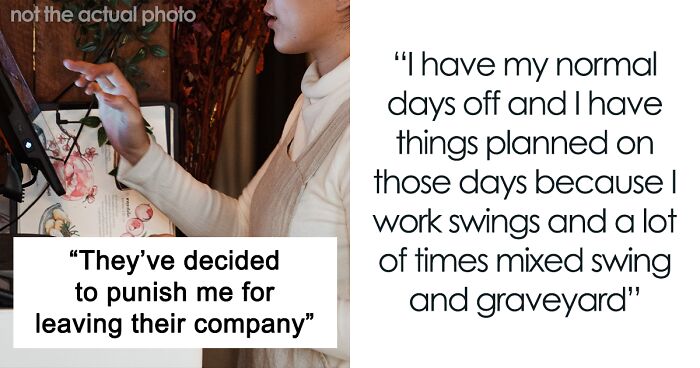



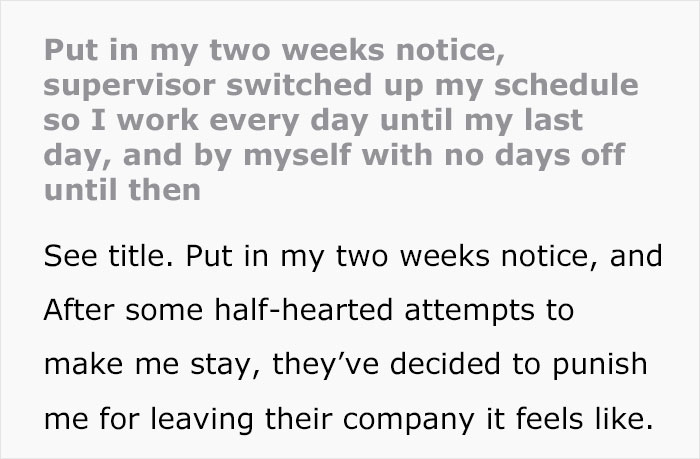
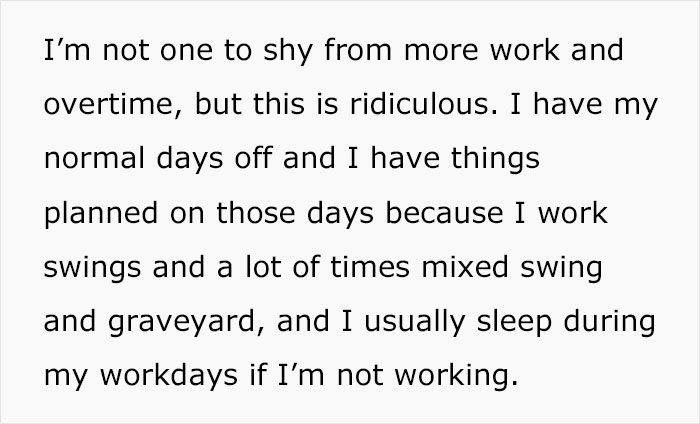
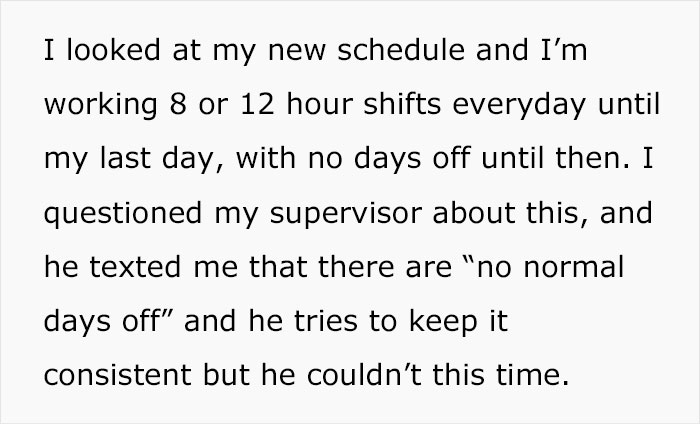
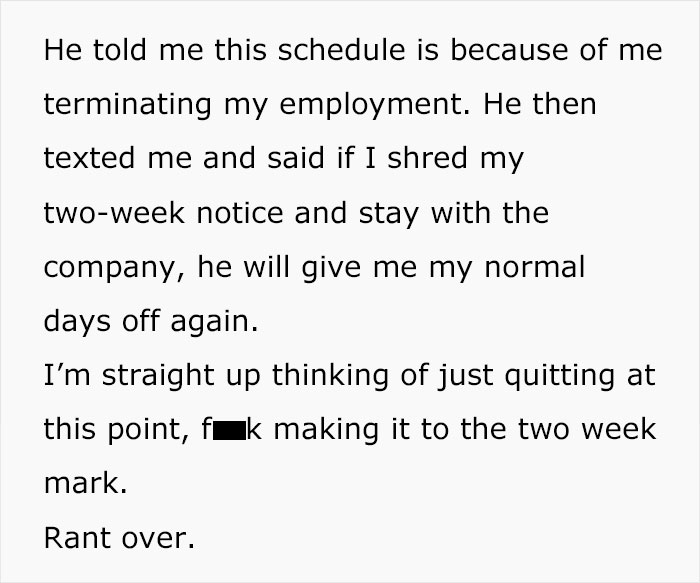
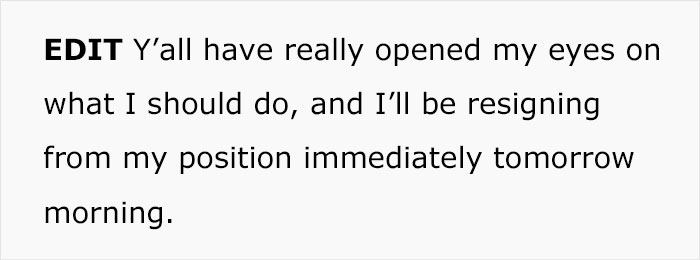
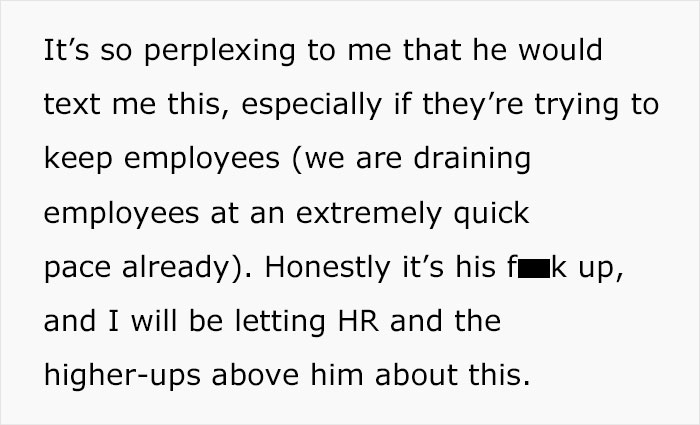
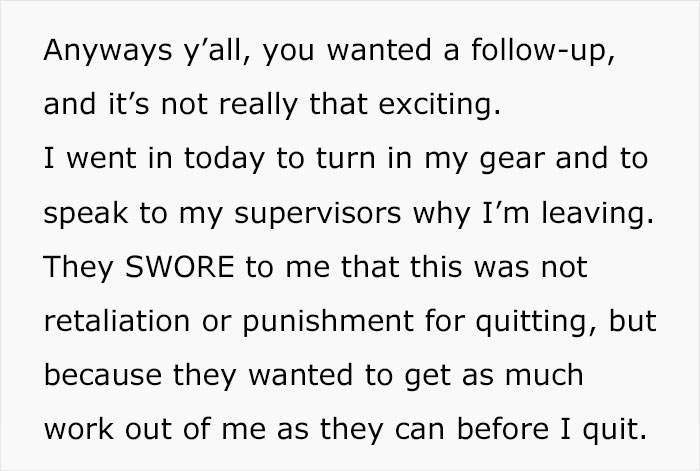
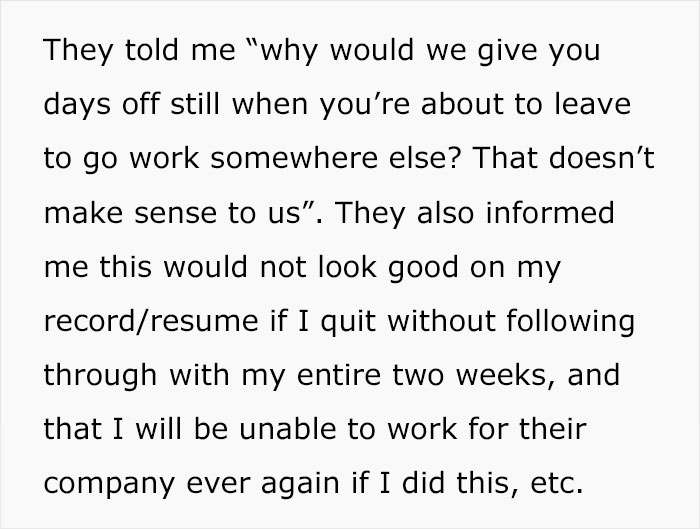
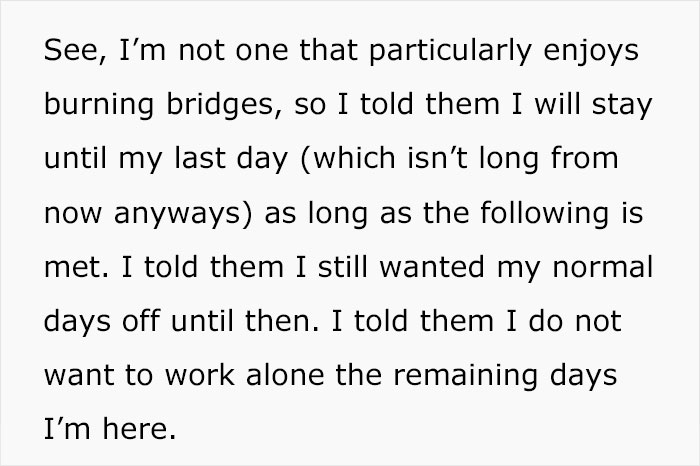
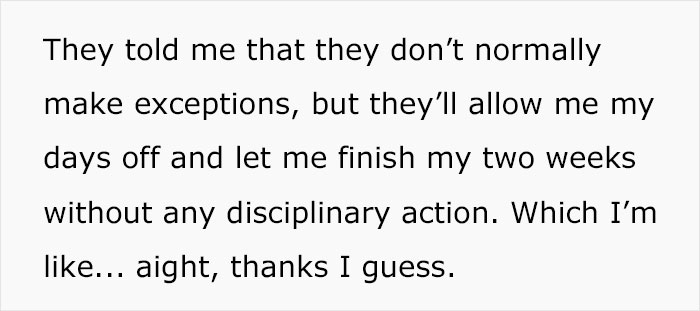

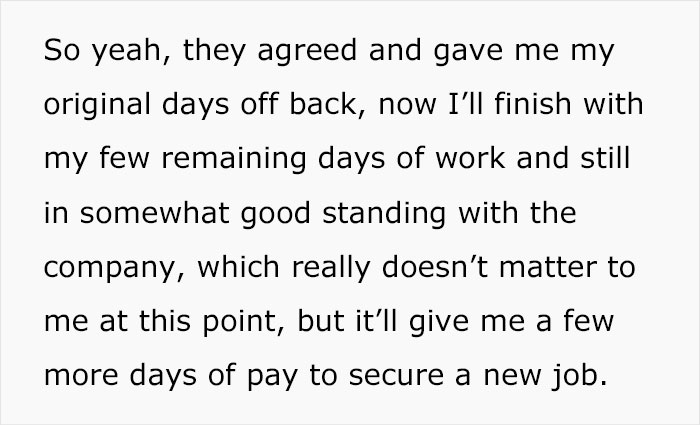
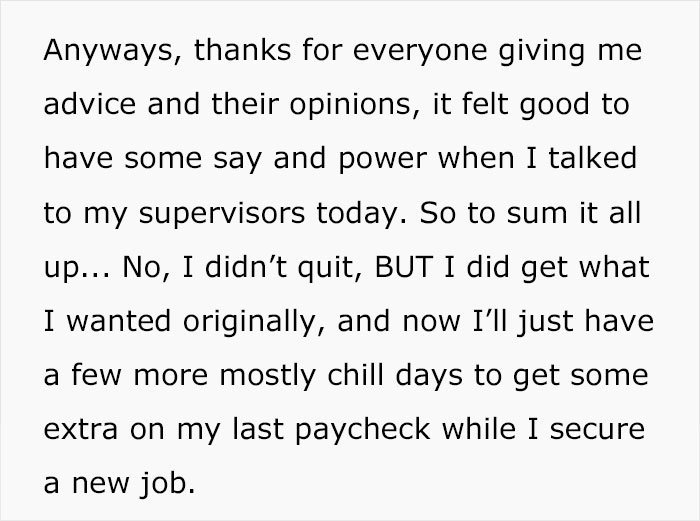

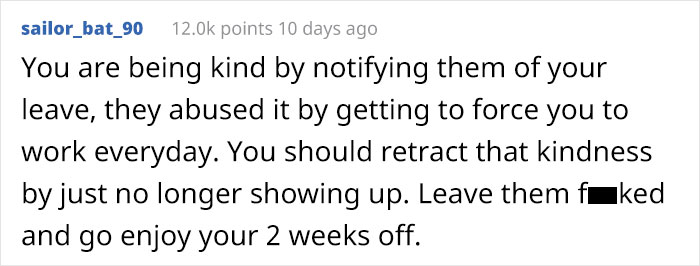
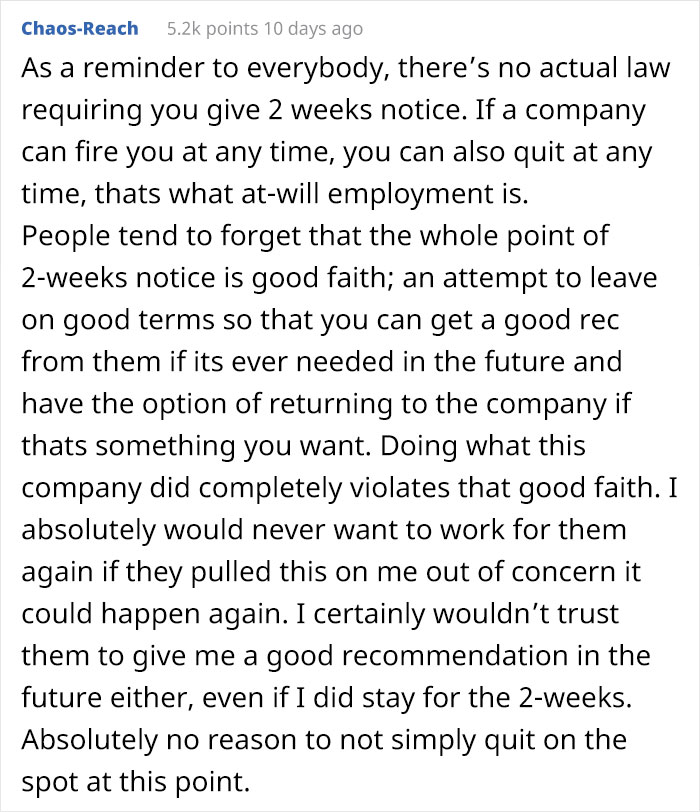

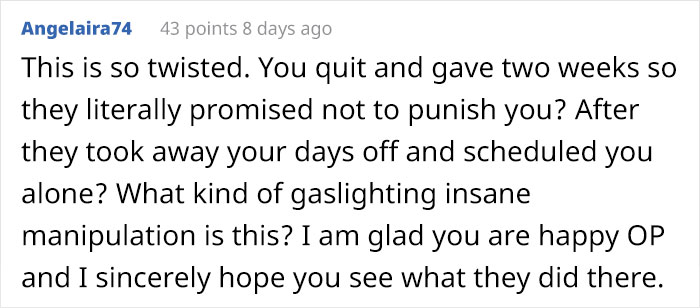
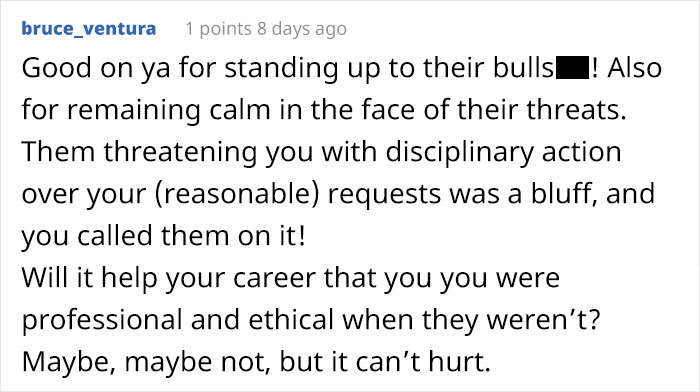





















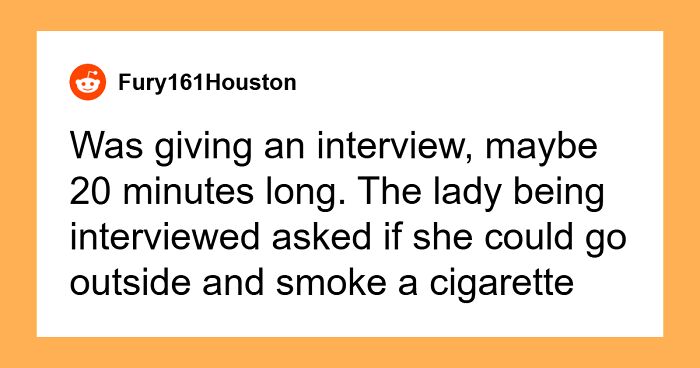


83
59